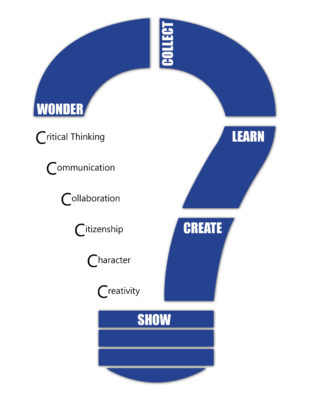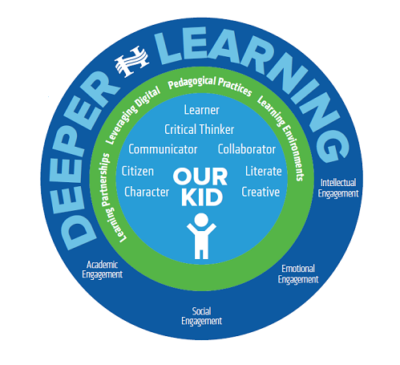
A child entering school today will graduate from high school into a very different world. Simply knowing facts will have little value. Educators, parents and businesses are realizing that the education system needs to evolve and change if it is going to prepare students to be effective contributors in our society. A growing emphasis is about helping students learn how to learn. The world is changing faster than ever and helping our students to adapt to that changing world is a focus for our school.
The main priority of Landmark Collegiate is to enhance and increase the intellectual engagement of our learners. Our vision for learning has come from research, collaboration, and professional development. We are making changes that reflect a growing emphasis on how learners learn, rather than only on what they learn. As a staff we have tried to identify the skills, knowledge, values and dispositions that we want from our students long after they have graduated from high school and how we can play a significant role in developing those attributes.
At Landmark Collegiate we want our students to learn through a much more active process. We are looking to engage our students in high levels of thinking which is important for long term learning. Inquiry learning is a powerful pedagogical practice because it aligns with how people learn. We have identified 5 stages that involve meaningful inquiry that intellectually engages students and develops many of the essential skills for students to become lifelong learners
The Wonder stage provokes the curiosity of learning and helps learners develop the skills of questioning through inquiry and active learning.
The Collect stage focuses developing important research skills needed to begin answering the essential questions that have developed in the wonder stage.
The Learn stage is where learners have to think critically about the information they have collected and decide what is relevant, reliable and useful. They strive to find an answer to the questions through analyzing, applying, evaluating and synthesizing.
In the Create stage learners design ways that demonstrate their learning to a public audience.
The Show stage is where learners develop the essential communication skills to explain what they have learned but more importantly the skills that they have developed.
During this final stage they also Reflect on their learning. While experience is critical for learning, as John Dewey said, we do not learn from experience, we learn from reflecting on the experience.
When learners are immersed in an a personalized learning experience, it gets them thinking about and questioning the topic. The learners work with their teacher to come up with strong, driving questions that will guide their learning. Not only are they learning relevant content and concepts, but they are also gaining skills in what have been identified as the 6 C’s for the 21st century.
- Character education— honesty, self-regulation and responsibility, perseverance, empathy for contributing to the safety and benefit of others, self-confidence, personal health and well-being, career and life skills.
- Citizenship — global knowledge, sensitivity to and respect for other cultures, active involvement in addressing issues of human and environmental sustainability.
- Communication — communicate effectively orally, in writing and with a variety of digital tools; listening skills.
- Critical thinking and problem solving — think critically to design and manage projects, solve problems, and make effective decisions using a variety of digital tools and resources.
- Collaboration — work in teams, learn from and contribute to the learning of others, social networking skills, empathy in working with diverse others.
- Creativity and imagination — economic and social entrepreneurialism, considering and pursuing novel ideas, and leadership for action
 If students graduate with a strong foundation of these skills, they will be better prepared for the 21st century. This is our vision for learning at Landmark Collegiate.
If students graduate with a strong foundation of these skills, they will be better prepared for the 21st century. This is our vision for learning at Landmark Collegiate.
